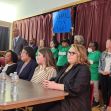In what is believed to be the first challenge in federal court to Critical Race Theory-based curricula, Nevada mother Gabrielle Clark is suing the State Charter School Authority and Democracy Prep Public Schools on behalf of her son William. At issue is a Democracy Prep class for high school seniors entitled Sociology of Change.
William is a biracial young man, with a deceased white father and a black mother who herself has one white parent. William has green eyes and what court documents describe as “blondish hair,” and, as a result, is often taken for white. Indeed, he appears to be considered the only white student in his class.
Part of the Sociology of Change curriculum calls for students to identify and label themselves according to such factors as race, gender and sexual orientation, and then, considering the “intersectionality” of these various identities, decide whether they are the oppressors or the oppressed. William was, as a result, saddled with ludicrous accusations of white privilege to the extent that he finally felt he could not continue in the class. After his mother’s request that he be removed from the class was rebuffed by the school’s principal and William was threatened with a failing grade and not being allowed to graduate, Gabrielle was referred to counsel by the group No Left Turn in Education.
A letter was sent to Kimberly Wall, superintendent of Democracy Prep Public Schools (a nationwide network of charter schools), again requesting that William be allowed to withdraw from the Sociology of Change class. The request was again refused, and, in December 2020, Gabrielle sued the school. As amended and filed on May 3, 2021, the complaint makes no fewer than twelve claims for relief. At the heart of these lies the argument that William’s First Amendment rights have been violated:
Schools may require students to recite facts or make arguments even if the student does not like the facts or disagrees with the arguments. What schools may not do, however, is compel a student to speak his private opinions about his personal identity in front of his teacher and classmates in a way that is antithetical to his values and beliefs, as part of an overall class that creates a hostile educational atmosphere for someone with his background and beliefs.
William was a student at what had been the Agassi College Preparatory Academy since the sixth grade and remained there after Democracy Prep acquired the school and imposed its “civics emphasis [that] replaced the general focus on college preparation that had characterized Agassi Academy.” That resulted in the Sociology of Change class, in which defendants compelled William to proclaim in class and in assignments his race, color, sex, gender and religious identities for which he in turn would receive official, derogatory labels.
In one instance, [The teacher] terminated class discussion when students, including William, objected to a PowerPoint slide….stating that “Reverse Racism Doesn’t Exist” and “Black Prejudice does Not Affect the Rights of White People.” William’s stated objection was that everyone can be racist…For this protected speech and other comments like it, [the teacher] terminated class discussion immediately.
Thus William’s speech was, on the one hand, being compelled, and, on the other, squelched in an effort to “invade the sphere of intellect and spirit which it is the purpose of the First Amendment to protect.”
In addition to the First Amendment claims, the complaint also alleges that the Sociology of Change class violates the Establishment Clause, which “forbids an official purpose to disapprove of a particular religion or of religion in general.” By labeling the Judeo-Christian precepts according to which William was raised as oppressive, according to the complaint, the class did exactly that.
Also alleged in the complaint is a pair of Fourteenth Amendment violations. The Equal Protection Clause was contravened when Defendants “intentionally treated [William] differently because of his skin color, faith, and his beliefs.” Furthermore, the Fourteenth Amendment’s promise of due process includes an “individual interest in avoiding disclosure of personal matters” by the government…William’s private views about his race, religion and family are intimate and personal facts which the government should not broadcast.
Plaintiffs also are suing based on Civil Rights Act violations, most specifically of Title VI: “Defendants harassed and discriminated against William on the basis of actual and perceived race, sex, and religion.” Plaintiffs also claim that Title IX was violated: after being repeatedly directed to divulge his sexual and gender identities, school officials…publicly labeled, repeatedly categorized and stereotyped William’s sexual and gender identities in a deliberately pejorative and offensive manner.
The suit additionally maintains that William’s rights under the Protection of Pupil Rights Amendment were violated. That law prohibits schools from requiring a student or a parent to “submit to a survey, analysis or evaluation” information based on such things as religious beliefs or sexuality without prior parental consent. No attempt at securing permission was made prior to compelling William to fill out graded litanies of highly personal questions.
The complaint also includes breach of contract claims and a further Fourteenth Amendment claim regarding a parent’s right to raise her child as she sees fit. Finally, Plaintiffs maintain that William’s rights under a Nevada law that guarantees statutory student expression under the First and Fourteenth Amendments were also violated.
Although school officials did relent and allow William to graduate, Plaintiffs continue to seek a declaratory judgment as to the unconstitutionality of the Sociology of Change class and an attendant permanent injunction that would prevent the school from continuing to teach material that runs counter to students’ constitutional rights. The suit also seeks unspecified nominal, compensatory and punitive damages.
According to Plaintiff’s counsel, there is an expectation that the case will succeed on its First Amendment merits. Notwithstanding William Clark’s somewhat anomalous situation, his success in court could establish an important precedent for other parents concerned about what and how their children are being taught.






